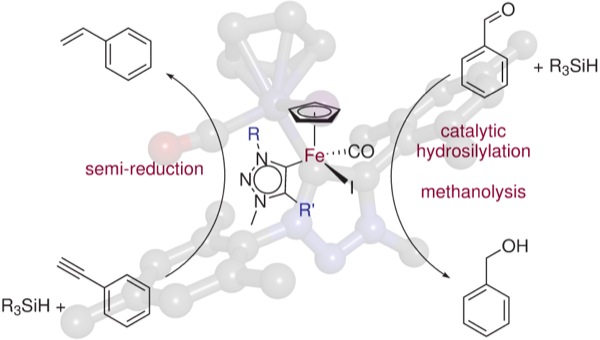|
Due to its abundancy, iron provides a cheap and attractive alternative to the rare and heavy transition metals for use in catalytic transformations. 1,2,3-Triazolylidene ligand precursors are easily accessed through "click" chemistry and have proven to be versatile ligands for a range of catalytic applications.
These ligands are strong δ-donors and transform cheap, abundant iron into an efficient catalyst for hydrosilylation and semi-reduction reactions.
This work was carried out in the group of Prof. Martin Albrecht.
References:
-
K. F. Donnelly, A. Petronilho, M. Albrecht;
"Application of 1,2,3-triazolylidenes as versatile NHC-type ligands: synthesis, properties, and application in catalysis and beyond"
Chem. Commun., 2013, 49(12), 1145-1159;
doi:10.1039/C2CC37881G.
-
Y. Wei, A. Petronilho, H. Mueller-Bunz, M. Albrecht;
"Mesoionic Triazolylidene Nickel Complexes: Synthesis, Ligand Lability, and Catalytic C-C Bond Formation Activity"
Organometallics, 2014, 33(20), 5834-5844;
doi:10.1021/om500593s.
-
C. J. Johnson, M. Albrecht;
"Triazolylidene Iron(II) Piano-Stool Complexes: Synthesis and Catalytic Hydrosilylation of Carbonyl Compounds"
Organometallics, 2017, 36(15), 2902-2913;
doi:10.1021/acs.organomet.7b00349.
|
